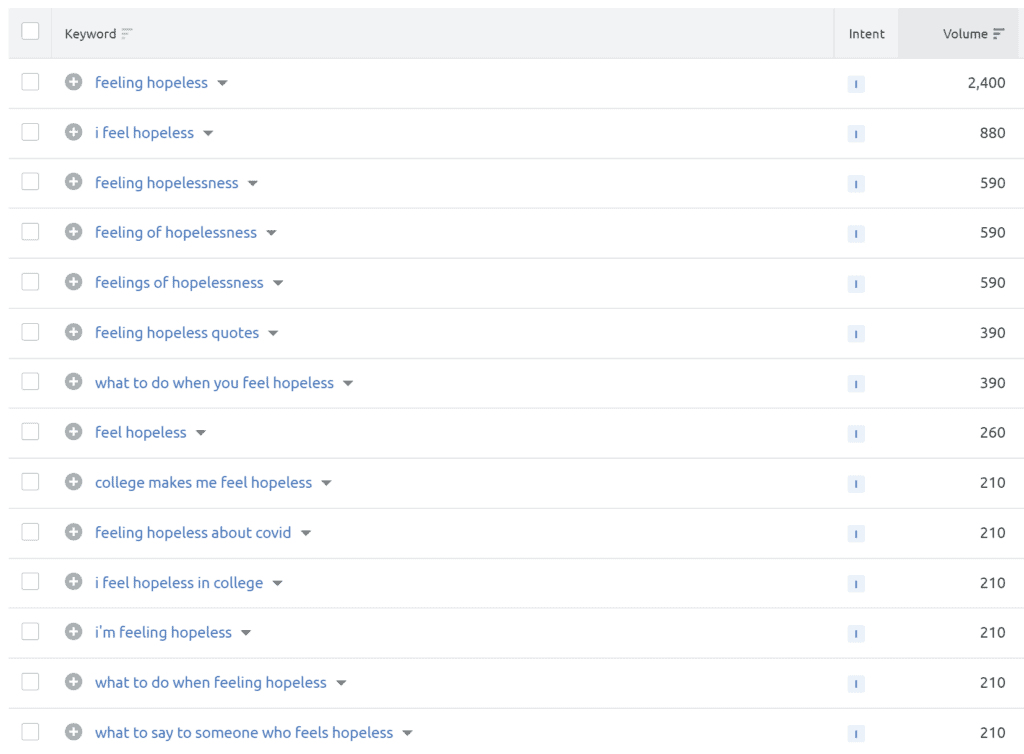What if I told you that the impact of your sermons didn’t have to end on Sunday?
Did you know that adding in a few church keywords to your sermons could ensure that every message is seen by hundreds or thousands of additional people every month, forever?
In this article, we’ll walk through 3 simple steps to use church keywords to create a digital impact with every sermon.
Step 1: Discover Keywords In Under 10 Minutes
Keywords are the words and phrases that people type into search engines (like Google) every day.
“Churches near me,”“Easter sunrise service,” and “Candlelight church services” are all examples of keywords people are using to find a church.
When you target the right keywords, searching people will also find your Christ-centered content every day, long after you give the sermon.
Suppose you felt led to do a sermon series on how God gives purpose and direction in life. Ten minutes of keyword research would reveal that there are about 3,000 monthly searches in the United States for terms like “feeling lost in life.”

That means there are 3,000 people every month looking for the message you are writing—but they will ONLY find it if you strategically target the keywords they are already typing into Google: “feeling lost in life.”
Or, maybe you are writing a sermon series on hope. You might be interested to find that there are over 5,000 monthly searches related to the term “I feel hopeless” every month in the United States. You can see the exact search terms and search volumes here:

If you need an easy-to-use keyword tool to find what users are looking for on Google, I love SEMRush’s keyword tool. You can also check out KWfinder. If you want to specifically take your ministry to people using YouTube, check out the Youtube keyword tool called VidIQ.
When a user searches a keyword in Google, Google matches their search to web pages that use that exact same search term.
If you don’t use the specific keywords people are already searching for, search engines like Google and YouTube WILL NOT SHOW YOUR CONTENT to the people who need to hear it most.
Example: One pastor we worked with titled his sermon something to do with “free agency in the Bible.”As it turned out, there are 0 searches per month for this term on Google.
When he changed his title to “free will in the Bible” people began to find his message online—because this keyword has about 2,000 searches each month.
Although these two terms are technically synonymous, Google’s algorithm sees them as completely separate terms. This is why keyword research can make all the difference as you try to reach a digital audience.
Additionally, because of the way search engines use location data to serve people results they believe will be most relevant to them, adding ten minutes of keyword research to your sermon writing routine will help your ministry show up for dozens, hundreds, and even thousands of different search terms people in the area around your church are searching every day.
When you meet the needs of the people in your community by giving them access to the information they are already looking for, you increase the likelihood that they will look to your church to meet their other needs as well.
When you meet the needs of the people in your community by giving them access to the information they are already looking for, you increase the likelihood that they will look to your church to meet their other needs as well. Click To TweetStep 2: Use Your Church Keywords Verbally
Once you’ve chosen your keywords, the next step is to verbally use them a few times as you give your sermon.
Every time your media team uploads one of your sermons to YouTube, YouTube automatically creates a transcription of your video. Youtube then searches that transcript for keywords to more effectively match your video up to searches people are typing into the Youtube search bar.
Just like on Google, if you don’t use your target keyword throughout your sermon, you will have a lower likelihood of showing up where you should for people searching on YouTube.
Step 3: Have Your Media Team Target Your Chosen Church Keyword
Once you’ve recorded your sermon, pass along your chosen keyword(s) to your media team and let them know to use those keywords when publishing your message online.
Website Keywords | Here are a few places your team should include your keyword on your website:
- Your keyword should appear in the URL of the webpage created for that sermon: www.yourchurchname.com/insert-keyword-here
- Use your keyword in the title of the webpage your sermon is published to.
- Use your keyword in the description section of the webpage your sermon is published to.
Each sermon (or sermon series) should have its own keyword-targeted page on your website. Don’t smash all of your sermons videos onto one long page. This confuses Google’s algorithm and your messages will NEVER be shown to Google users.
YouTube Keywords | Here are a few places your team should include your keyword on your YouTube Account:
- The YouTube video title
- The video description
- The video tags
- Your keyword should be spoken verbally by you in the video
Bonus Tip: If you want to get even further reach with each sermon, have your media team cut each message into 5-12 minute clips. They can then retroactively keyword target each clip and post them to Youtube in the same way discussed above. Now each sermon can appeal to multiple keywords people are looking for every day.
Church Keywords: Create A Digital Impact With Your Sermons in 3 Simple Steps Click To TweetBrett Henderson is the digital marketing director at Clickmill.co and is the author of The Digital Ministry: Reaching The Ends Of The Earth Without Leaving Home. Brett has consulted with ministry leaders internationally, helping them create custom marketing strategies that get results.
[Free Webinar Replay] Preaching Best Practices
Are you a pastor who is looking to...
- Make your teaching more applicable?
- Clarify what you should be teaching about in this cultural season?
- Learn how to design better teaching for believers and the spiritually curious?
- Innovate your preaching and make it sticky?
Get the video replay of this free 1-hour webinar featuring panelists Clay Scroggins, Dan Lian, and Jason Anderson.







2 Comments
Wow! Great article. I learned alot and I can see how this can totally transform a pastor’s ability to reach a massive audience from just doing a few simple steps. Brilliant!
Thanks, Jonathan! Glad it was helpful.